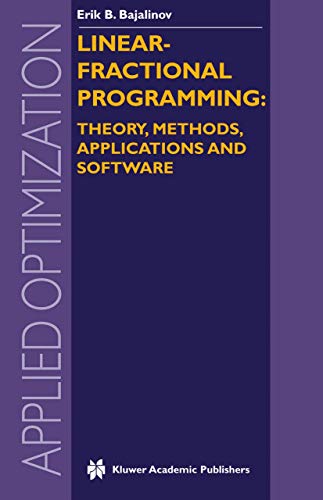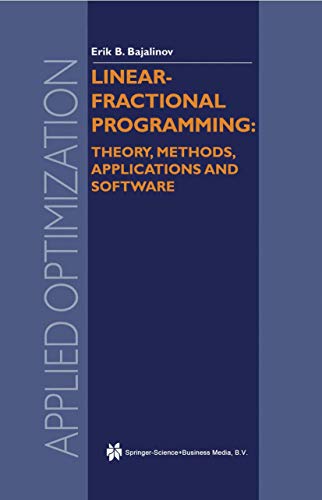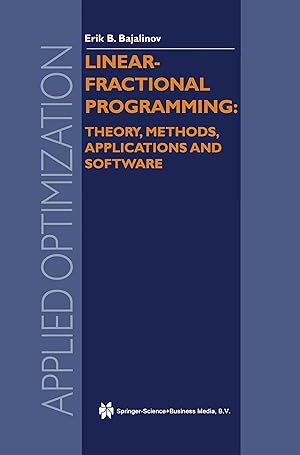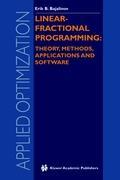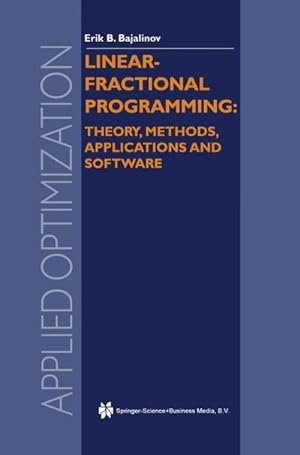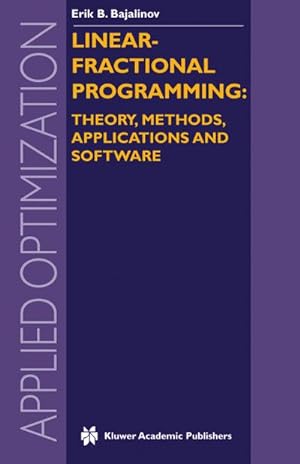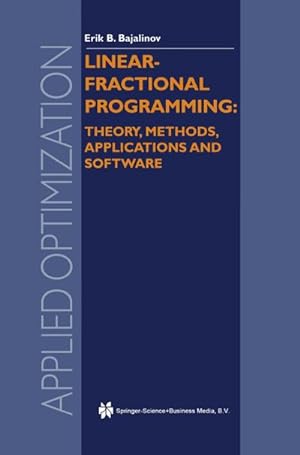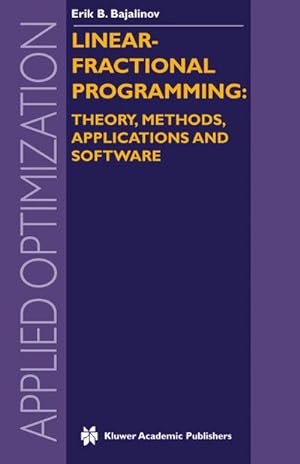Linear Fractional Programming Theory Methods by Bajalinov E B (20 results)
Search filters
Product Type
- All Product Types
- Books (20)
- Magazines & Periodicals (No further results match this refinement)
- Comics (No further results match this refinement)
- Sheet Music (No further results match this refinement)
- Art, Prints & Posters (No further results match this refinement)
- Photographs (No further results match this refinement)
- Maps (No further results match this refinement)
- Manuscripts & Paper Collectibles (No further results match this refinement)
Condition Learn more
- New (15)
- As New, Fine or Near Fine (2)
- Very Good or Good (No further results match this refinement)
- Fair or Poor (No further results match this refinement)
- As Described (3)
Binding
Collectible Attributes
- First Edition (No further results match this refinement)
- Signed (No further results match this refinement)
- Dust Jacket (No further results match this refinement)
- Seller-Supplied Images (10)
- Not Print on Demand (14)
Language (1)
Price
- Any Price
- Under US$ 25 (No further results match this refinement)
- US$ 25 to US$ 50 (No further results match this refinement)
- Over US$ 50
Free Shipping
Seller Location
Seller Rating
-
Linear-Fractional Programming Theory, Methods, Applications and Software (Applied Optimization, 84)
Seller: ALLBOOKS1, Direk, SA, Australia
Brand new book. Fast ship. Please provide full street address as we are not able to ship to P O box address.
-
Linear-Fractional Programming Theory, Methods, Applications and Software (Applied Optimization, 84)
Seller: ALLBOOKS1, Direk, SA, Australia
Brand new book. Fast ship. Please provide full street address as we are not able to ship to P O box address.
-
Linear-Fractional Programming Theory, Methods, Applications and Software
Seller: Books Puddle, New York, NY, U.S.A.
Condition: Used. pp. 456.
-
Linear-Fractional Programming Theory, Methods, Applications and Software (Applied Optimization)
Seller: Lucky's Textbooks, Dallas, TX, U.S.A.
Condition: New.
-
Linear-Fractional Programming Theory, Methods, Applications and Software (Applied Optimization, 84)
Seller: Lucky's Textbooks, Dallas, TX, U.S.A.
Condition: New.
-
Linear-Fractional Programming Theory, Methods, Applications and Software
Seller: Majestic Books, Hounslow, United Kingdom
US$ 177.45
US$ 8.75 shipping
Ships from United Kingdom to U.S.A.Quantity: 1 available
Add to basketCondition: Used. pp. 456 Illus.
-
Linear-Fractional Programming Theory, Methods, Applications and Software
Seller: Biblios, Frankfurt am main, HESSE, Germany
Condition: Used. pp. 456.
-
Linear-Fractional Programming Theory, Methods, Applications and Software
Seller: moluna, Greven, Germany
US$ 164.99
US$ 57.64 shipping
Ships from Germany to U.S.A.Quantity: Over 20 available
Add to basketCondition: New.
-
Linear-Fractional Programming Theory, Methods, Applications and Software
Seller: moluna, Greven, Germany
US$ 164.99
US$ 57.64 shipping
Ships from Germany to U.S.A.Quantity: Over 20 available
Add to basketGebunden. Condition: New.
-
Linear-Fractional Programming Theory, Methods, Applications and Software
Seller: AHA-BUCH GmbH, Einbeck, Germany
Taschenbuch. Condition: Neu. Druck auf Anfrage Neuware - Printed after ordering - This is a book on Linear-Fractional Programming (here and in what follows we will refer to it as 'LFP'). The field of LFP, largely developed by Hungarian mathematician B. Martos and his associates in the 1960's, is concerned with problems of op timization. LFP problems deal with determining the best possible allo cation of available resources to meet certain specifications. In particular, they may deal with situations where a number of resources, such as people, materials, machines, and land, are available and are to be combined to yield several products. In linear-fractional programming, the goal is to determine a per missible allocation of resources that will maximize or minimize some specific showing, such as profit gained per unit of cost, or cost of unit of product produced, etc. Strictly speaking, linear-fractional programming is a special case of the broader field of Mathematical Programming. LFP deals with that class of mathematical programming problems in which the relations among the variables are linear: the con straint relations (i.e. the restrictions) must be in linear form and the function to be optimized (i.e. the objective function) must be a ratio of two linear functions.
-
Linear-Fractional Programming Theory, Methods, Applications and Software
Language: English
Published by Springer US, Springer US, 2003
ISBN 10: 1402076266 ISBN 13: 9781402076268
Seller: AHA-BUCH GmbH, Einbeck, Germany
Buch. Condition: Neu. Druck auf Anfrage Neuware - Printed after ordering - This is a book on Linear-Fractional Programming (here and in what follows we will refer to it as 'LFP'). The field of LFP, largely developed by Hungarian mathematician B. Martos and his associates in the 1960's, is concerned with problems of op timization. LFP problems deal with determining the best possible allo cation of available resources to meet certain specifications. In particular, they may deal with situations where a number of resources, such as people, materials, machines, and land, are available and are to be combined to yield several products. In linear-fractional programming, the goal is to determine a per missible allocation of resources that will maximize or minimize some specific showing, such as profit gained per unit of cost, or cost of unit of product produced, etc. Strictly speaking, linear-fractional programming is a special case of the broader field of Mathematical Programming. LFP deals with that class of mathematical programming problems in which the relations among the variables are linear: the con straint relations (i.e. the restrictions) must be in linear form and the function to be optimized (i.e. the objective function) must be a ratio of two linear functions.
-
Linear-Fractional Programming Theory, Methods, Applications and Software (Applied Optimization)
Seller: Revaluation Books, Exeter, United Kingdom
US$ 275.51
US$ 16.84 shipping
Ships from United Kingdom to U.S.A.Quantity: 2 available
Add to basketPaperback. Condition: Brand New. 453 pages. 9.30x6.20x1.00 inches. In Stock.
-
Linear-Fractional Programming Theory, Methods, Applications and Software (Applied Optimization, 84)
Seller: Mispah books, Redhill, SURRE, United Kingdom
US$ 303.82
US$ 33.67 shipping
Ships from United Kingdom to U.S.A.Quantity: 1 available
Add to basketPaperback. Condition: Like New. Like New. book.
-
Linear-Fractional Programming: Theory, Methods, Applications and Software (Applied Optimization)
Seller: Mispah books, Redhill, SURRE, United Kingdom
US$ 431.45
US$ 33.67 shipping
Ships from United Kingdom to U.S.A.Quantity: 1 available
Add to basketHardcover. Condition: Like New. Like New. book.
-
Linear-Fractional Programming Theory, Methods, Applications and Software
Language: English
Published by Springer US Dez 2013, 2013
ISBN 10: 1461348226 ISBN 13: 9781461348221
Seller: BuchWeltWeit Ludwig Meier e.K., Bergisch Gladbach, Germany
Taschenbuch. Condition: Neu. This item is printed on demand - it takes 3-4 days longer - Neuware -This is a book on Linear-Fractional Programming (here and in what follows we will refer to it as 'LFP'). The field of LFP, largely developed by Hungarian mathematician B. Martos and his associates in the 1960's, is concerned with problems of op timization. LFP problems deal with determining the best possible allo cation of available resources to meet certain specifications. In particular, they may deal with situations where a number of resources, such as people, materials, machines, and land, are available and are to be combined to yield several products. In linear-fractional programming, the goal is to determine a per missible allocation of resources that will maximize or minimize some specific showing, such as profit gained per unit of cost, or cost of unit of product produced, etc. Strictly speaking, linear-fractional programming is a special case of the broader field of Mathematical Programming. LFP deals with that class of mathematical programming problems in which the relations among the variables are linear: the con straint relations (i.e. the restrictions) must be in linear form and the function to be optimized (i.e. the objective function) must be a ratio of two linear functions. 456 pp. Englisch.
-
Linear-Fractional Programming Theory, Methods, Applications and Software
Seller: preigu, Osnabrück, Germany
Buch. Condition: Neu. Linear-Fractional Programming Theory, Methods, Applications and Software | E. B. Bajalinov | Buch | xxviii | Englisch | 2003 | Springer US | EAN 9781402076268 | Verantwortliche Person für die EU: Springer Verlag GmbH, Tiergartenstr. 17, 69121 Heidelberg, juergen[dot]hartmann[at]springer[dot]com | Anbieter: preigu Print on Demand.
-
Linear-Fractional Programming Theory, Methods, Applications and Software
Seller: preigu, Osnabrück, Germany
Taschenbuch. Condition: Neu. Linear-Fractional Programming Theory, Methods, Applications and Software | E. B. Bajalinov | Taschenbuch | xxviii | Englisch | 2013 | Springer US | EAN 9781461348221 | Verantwortliche Person für die EU: Springer Verlag GmbH, Tiergartenstr. 17, 69121 Heidelberg, juergen[dot]hartmann[at]springer[dot]com | Anbieter: preigu Print on Demand.
-
Linear-Fractional Programming Theory, Methods, Applications and Software
Language: English
Published by Springer US, Springer US Nov 2003, 2003
ISBN 10: 1402076266 ISBN 13: 9781402076268
Seller: buchversandmimpf2000, Emtmannsberg, BAYE, Germany
Buch. Condition: Neu. This item is printed on demand - Print on Demand Titel. Neuware -This is a book on Linear-Fractional Programming (here and in what follows we will refer to it as 'LFP'). The field of LFP, largely developed by Hungarian mathematician B. Martos and his associates in the 1960's, is concerned with problems of op timization. LFP problems deal with determining the best possible allo cation of available resources to meet certain specifications. In particular, they may deal with situations where a number of resources, such as people, materials, machines, and land, are available and are to be combined to yield several products. In linear-fractional programming, the goal is to determine a per missible allocation of resources that will maximize or minimize some specific showing, such as profit gained per unit of cost, or cost of unit of product produced, etc. Strictly speaking, linear-fractional programming is a special case of the broader field of Mathematical Programming. LFP deals with that class of mathematical programming problems in which the relations among the variables are linear: the con straint relations (i.e. the restrictions) must be in linear form and the function to be optimized (i.e. the objective function) must be a ratio of two linear functions.Springer Verlag GmbH, Tiergartenstr. 17, 69121 Heidelberg 456 pp. Englisch.
-
Linear-Fractional Programming Theory, Methods, Applications and Software
Language: English
Published by Springer US, Springer New York Dez 2013, 2013
ISBN 10: 1461348226 ISBN 13: 9781461348221
Seller: buchversandmimpf2000, Emtmannsberg, BAYE, Germany
Taschenbuch. Condition: Neu. This item is printed on demand - Print on Demand Titel. Neuware -This is a book on Linear-Fractional Programming (here and in what follows we will refer to it as 'LFP'). The field of LFP, largely developed by Hungarian mathematician B. Martos and his associates in the 1960's, is concerned with problems of op timization. LFP problems deal with determining the best possible allo cation of available resources to meet certain specifications. In particular, they may deal with situations where a number of resources, such as people, materials, machines, and land, are available and are to be combined to yield several products. In linear-fractional programming, the goal is to determine a per missible allocation of resources that will maximize or minimize some specific showing, such as profit gained per unit of cost, or cost of unit of product produced, etc. Strictly speaking, linear-fractional programming is a special case of the broader field of Mathematical Programming. LFP deals with that class of mathematical programming problems in which the relations among the variables are linear: the con straint relations (i.e. the restrictions) must be in linear form and the function to be optimized (i.e. the objective function) must be a ratio of two linear functions.Springer Verlag GmbH, Tiergartenstr. 17, 69121 Heidelberg 456 pp. Englisch.
-
Linear-Fractional Programming Theory, Methods, Applications and Software
Language: English
Published by Springer US Nov 2003, 2003
ISBN 10: 1402076266 ISBN 13: 9781402076268
Seller: BuchWeltWeit Ludwig Meier e.K., Bergisch Gladbach, Germany
Buch. Condition: Neu. This item is printed on demand - it takes 3-4 days longer - Neuware -This is a book on Linear-Fractional Programming (here and in what follows we will refer to it as 'LFP'). The field of LFP, largely developed by Hungarian mathematician B. Martos and his associates in the 1960's, is concerned with problems of op timization. LFP problems deal with determining the best possible allo cation of available resources to meet certain specifications. In particular, they may deal with situations where a number of resources, such as people, materials, machines, and land, are available and are to be combined to yield several products. In linear-fractional programming, the goal is to determine a per missible allocation of resources that will maximize or minimize some specific showing, such as profit gained per unit of cost, or cost of unit of product produced, etc. Strictly speaking, linear-fractional programming is a special case of the broader field of Mathematical Programming. LFP deals with that class of mathematical programming problems in which the relations among the variables are linear: the con straint relations (i.e. the restrictions) must be in linear form and the function to be optimized (i.e. the objective function) must be a ratio of two linear functions. 456 pp. Englisch.


